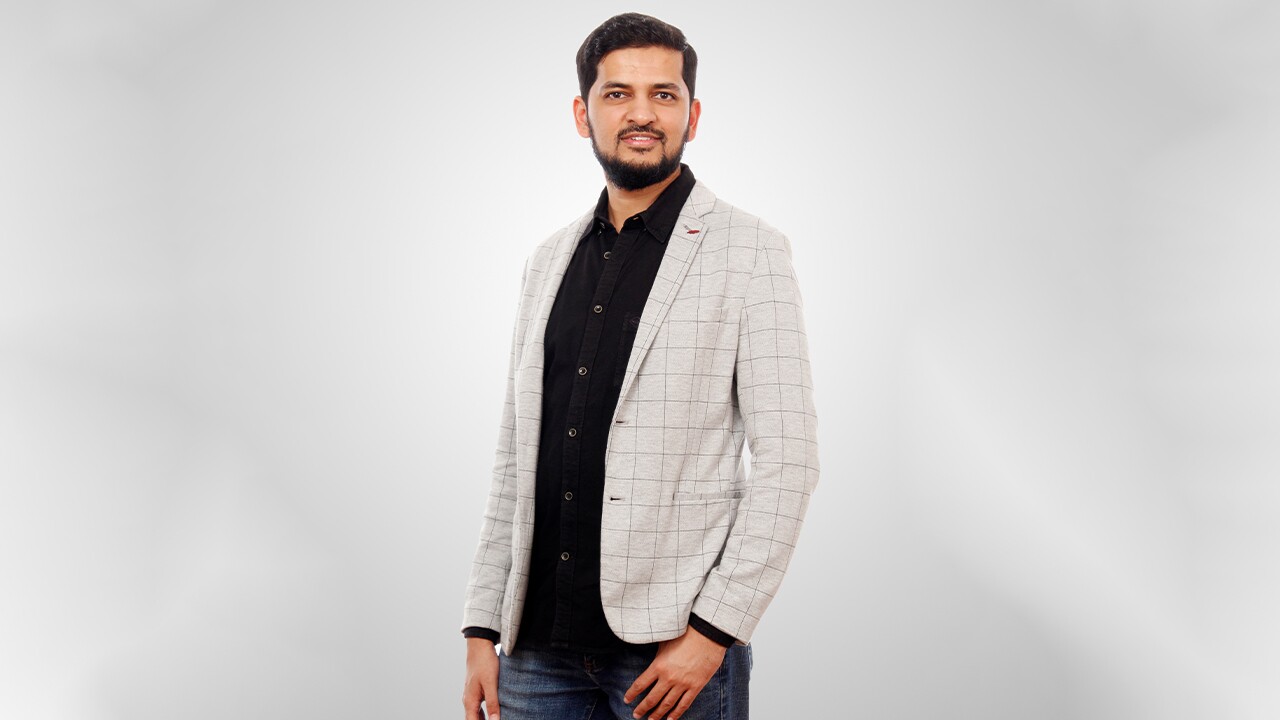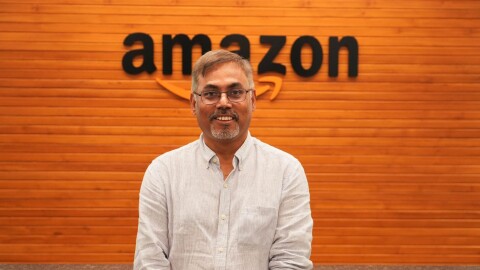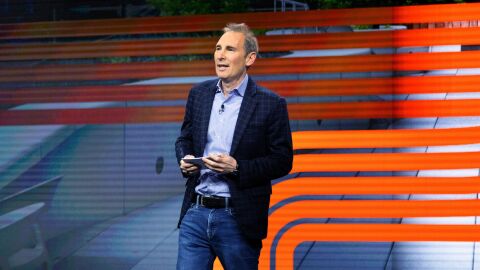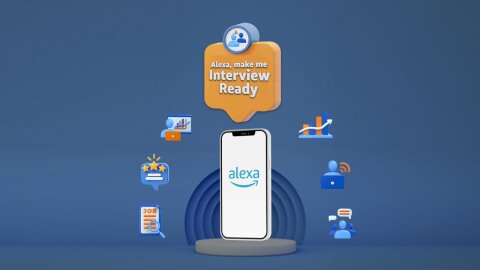
What stood out the most about him when we met were his storytelling abilities, his funny bone, and his relentless Customer Obsession. An Amazon veteran with more than 13 years with the organization, he’s also a boomerang – someone who left Amazon and later returned. Since his return about 4 years ago, he has been leading Amazon India’s effort to understand new internet users, help them break barriers to online shopping, and reap all of its benefits.
Meet Zahid Khan, Director – India Reach, whose journey at Amazon has meandered from tech to marketing to understanding consumer shopping behaviors. Hear about how he became a boomerang, how he has explored different job families at Amazon over the years, his experience planting and growing many seed initiatives from zero to millions of users, and more.
Zahid, tell us a bit about your professional journey prior to Amazon and your time here.
I grew up in the Middle East, my dad used to be an engineer in Kuwait. I studied there, went to the US for a bachelor's degree, and worked for four years as a software engineer in California. Then I did a Master's in Computer Science.
I joined Amazon right after post-graduation in a role that doesn't exist anymore – Technical Product and Program Manager (TPPM) – which took a Software Development Manager (SDM), a Technical Program Manager (TPM), and a Product Manager (PM), rolled them into one, and assigned the person a small team.
It was very challenging because the PM part of me wanted to build more and more value for customers, and the TPM part of me wanted to deliver on time. So, it was a little bit schizophrenic [chuckles]. It didn't last too long, but it taught me a lot.
Initially, I was a coder. I then did a systems analyst role, which was a nice transition path from coding to understanding systems and business. And for me then, product management was a natural and logical next step that I really enjoyed.
I'm a high-level thinker. I used to think ‘mental models’ even before I knew the phrase, which was super helpful for product management.
I've done many roles at Amazon – TPPM, TPM, PM, Marketing Manager, and now I guess you would call me a General Manager. But if you were to put a gun to my head and ask me which one job family I belonged to… I'm a builder, so I'd probably say Product Management. I really like solving customer problems with whatever tools you need to solve them – whether technical or non-technical.
How did you chance upon a Marketing Manager role, given your background was completely technical?
That’s a fun story. I was a TPM then, and I remember this like yesterday because it was April 9, 2010, the day before my wedding. Amit Agarwal called me out of the blue. I didn't know him very well, but I'd heard about him from back in the day when he used to be an L7 trying to launch ‘that web service’ (Flexible Payment Service). I would also get messages from him when he was a Technical Advisor to Jeff, for some of the work I did back then.
He started pitching me this role for Amazon India, and it sounded enticing! I had always been a product manager for products that were used by customers elsewhere, like in Germany, France, Japan. For a product manager, you always get a kick when you're building something that your family might give you feedback on, like, “Hey, it’s great,” or “It sucks!” That instant feedback is gold.
I firmly believe that any worthwhile learning is super painful when it's happening, but once you've learned, it's so gratifying.
So, I thought, “Awesome, I'm going to build products for India.” And before you knew it, he was pitching me a Marketing Manager role and almost involuntarily, I asked, “Amit, why? I have no MBA, and zero marketing experience.”
Amit laughed, and explained how Amazon is one of the few places where if somebody exhibits good Leadership Principles and there's a space that does not require deep domain expertise, if you can learn your way through… the company is willing to bet on you, allow you to jump off the deep end, and then you sink or swim! But Amazon’s always got you.
I chose to take up the challenge. It was such a wild ride. I didn’t know anything about digital marketing or performance marketing. And in that first year I became a huge nag to marketers across Amazon. I used to find them anywhere they were hiding, the US, UK, and set up meetings at crazy hours. It was such a good decision. I firmly believe that any worthwhile learning is super painful when it's happening, but once you've learned, it's so gratifying.
We are intrigued by your boomerang journey. What were your reasons for leaving Amazon and later returning?
I remember back in my second year at Amazon, I was an L5 TPPM, and had a few folks reporting to me. My team had a poll on, “Who is most likely to start up/become an entrepreneur?” The unanimous decision was that it would be me! They were on point, because it's always been on my bucket list to either start up on my own, or work at a startup. Being in the critical path for business success is where all our strengths and weaknesses come to the forefront under high pressure, and where the most learning happens.
I never actively pursued starting up because I was just having such a blast at Amazon, but then a common friend connected me to the founder of an up-and-coming start up. He got me very curious and excited about the problems they were trying to solve. I felt I had the chance to solve those problems, I could make a real impact. I applied what I’d learned from Jeff and other Amazon leaders – the regret minimization framework - that if I didn’t do this, would I regret the decision a few years later no matter what the outcome was? My answer was a yes. So I left Amazon, and I had a lot of fun there. My team and I were able to make a lot of impact in that first year, especially with scaling, using automation to reduce marketing costs, raising the bar with hiring and developing talent.
The reason I returned to Amazon - I really like our culture of thoughtful innovation.
The reason I returned to Amazon - I really like our culture of thoughtful innovation.
We have long planning cycles, and when I was younger and less mature, I used to think, “Why are we taking so long? Why don't we just execute?” We take our time aiming, but after that we fire a cannon that makes a solid dent.
This didn’t happen at the startup I joined. It was a culture of innovation, no doubt, but the innovation wasn’t carefully thought through like it is here. One of the cultural changes I was trying to affect was to think deeper, and keep the bets up for longer durations. In startups, they usually talk in terms of weeks and quarters rather than years, and I was trying to get to multi-year bets. Even though I loved the startup founders, and they appreciated what I’d accomplished with them, I figured that if I'm not going to be on a mission for a few years, I wouldn’t stay excited. So, I decided to look for something else, and talked to Amit, who is also a hard pitcher. He presented the opportunity that I'm working on now, and I returned!
From the experimental Udaan project to the successful Amazon Easy program. Tell us about the journey.
The journey has been very fulfilling, and is the perfect example of why I love innovating at Amazon. I still remember many years ago, just three of us – Amit, Kishore (my manager) and I sitting in Amit’s office, and iterating over the Udaan PRFAQ. We made just 1 hire, and I told him his job was to launch a pilot without any additional headcount or investments. That constrained environment with a clear vision brings out the best in people, and I remember we cobbled our way to a solution.
It was a beautifully designed app that worked in poor internet connections by doing fancy SMS-based communications for price, and inventory checks, and could operate very well even without an internet connection! And it failed. Miserably.
Instead of losing hope, we went back to the customer, and the customer problem. We realized that the main problem we were focusing on – patchy internet connection in smaller towns – was slowly becoming a non-issue. Airtel, and then Jio, were rapidly solving that problem. But even with internet, these customers weren’t shopping online. Studying their behavior, we realized it was because they weren’t comfortable using the Amazon app or site. They felt it wasn’t for them – and they lacked the “trust” in online shopping because they had heard some story about someone getting a brick when they’d ordered a phone.
So, we pivoted the problem statement and decided we needed to solve for trust. In smaller towns, customers shop at mom-and-pop-stores that have been around for many years, sometimes generations. These are trusted stores. We partnered with these storeowners, trained them on how to use the app, and they in turn trained their local customers. Today, 1.2 lakh such stores offer this assistance, and this introduces millions of customers to Amazon!
It’s been a phenomenal journey that led me and the Easy team to many corners of India to speak to local entrepreneurs; we even went to another country to study similar models there. I’m really proud of what we’ve achieved so far, and it’s still day 1!
Surprisingly, passions outside of work, power the “work flywheel”. When you have time off, you come back happier to work!

What do you think are three essential qualities for us to cultivate to be successful at Amazon?
Number one is empathy. That is super important, and also core to being customer obsessed and employee obsessed – in line with our 15th Leadership Principle of Strive to be Earth’s Best Employer. The second one is, pay attention to the details. It shows you care about the end user’s experience – whether it’s a customer, or someone reading your doc or email, or anything.
And the third thing, which might sound a little counterintuitive – don’t let your work define you. Find at least one serious interest in life outside of work that you’re passionate about. It could be sports, investing in your kids, doing community work, or something else. If you're working on something big and you're trying to make a dent in the world, it's always going to be grueling and it's going to take time. Amazon is no different. Surprisingly, passions outside of work, power the “work flywheel”. When you have time off, you come back happier to work!












